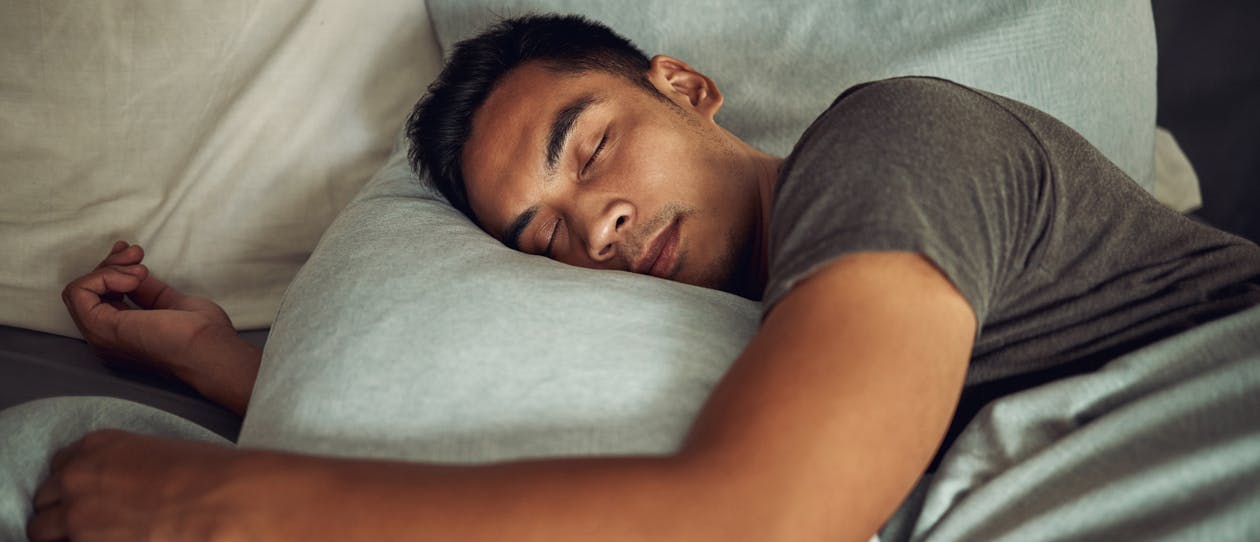
- Health hub/
- A Guide To Men's Health And Supplements/
- Don't be in denial about your snoring


Snoring happens because when you inhale and exhale during sleep, the moving air causes the relaxed tissues near the back of the throat to vibrate. The muscles loosen, narrowing the airway.
Depending on the size of the muscles and tissues at the back of the neck, some people may be more prone to snoring. If the muscles there are very loose and relaxed, this can lead to snoring.
Contributing factors for snoring include being overweight, pregnancy, large tonsils, deviated septum tongue, nasal polyps, small jaw and sedative medications.
The difference between snoring and sleep apnoea
Snoring can be mild and infrequent, which can be normal and usually not a health concern. However, if snoring is loud and sounds like the person is choking, snorting or gasping, there is a high chance it could be obstructive sleep apnoea. Not all who snore have OSA.
Sleep apnoea
Obstructive sleep apnoea is when the throat becomes partly or entirely blocked at certain points during sleep. Breathing can pause for a period of 10 seconds to minutes. This lapse in breathing can occur repeatedly.
According to the Sleep Foundation, this can disrupt sleep and the balance of oxygen and carbon dioxide in the body.
Signs of sleep apnoea
Apart from the loud gasping, choking or snorting snoring sounds, other signs of potential sleep apnoea include daytime drowsiness, lack of concentration, snoring three or more times a week, teeth grinding during sleep, and morning headaches and congestion.
If you sleep alone, you might want to look into using a recorder when you sleep to see if you snore and monitor this over multiple nights, as it’s common for snoring to occur on some nights and not on others. Together with this, you can see whether you also exhibit any of the other signs of OSA, such as daytime sleepiness, trouble focusing or unexplained mood changes.
If you become aware that you have OSA, it’s important to see a GP for advice and treatment. If it goes untreated, The Sleep Foundation explains, it can have major health consequences, including daytime drowsiness, which can be unsafe.
Treatment for snoring
Snoring that is mild or infrequent may not need treatment or just simple treatment, unless it’s causing disturbance to their sleep or someone else’s.
However, people with OSA require more involved treatment.
Lifestyle measures for treatment and prevention
- Lifestyle changes are often recommended in conjunction with other treatments. They also serve as prevention measures for snoring. Their focus is on adjustments to your sleeping position or opening up the airways and include:
- Reducing alcohol intake and certain medications such as sedatives, which, according to Cleveland Clinic, can relax your muscles, restricting airflow through your nose, mouth and throat
- Maintaining a healthy weight: Overweight is a risk factor for snoring and OSA
- Sleeping on the back may increase the likelihood of the airway becoming obstructed, so it’s worth trying another sleep position to see if there are any improvements
- Raising the bedhead or using a wedged pillow may help
- Reducing nasal congestion as this can block airflow through the mouth
Continuous Positive Airway Pressure (CPAP) machines
Apart from lifestyle measures, Continuous Positive Airway Pressure (CPAP) machines are the most often used treatment for sleep apnoea and are often effective. They work by pumping pressurised air into the airway through a hose and mask to prevent the airway from being obstructed. These devices need to be prescribed and calibrated.
Anti-snoring mouthpieces
For those who can’t tolerate the CPAP machine, custom fit anti-snoring mouthpieces are available, which help hold the tongue or jaw in a stable position to prevent airway blockages while you sleep.
If these measures don’t work, surgery is an available option to shrink excess tissue from the back of the throat or nose or to correct any structural issues contributing to the airway restriction.
Seek professional help
See a healthcare provider for advice and investigation if snoring disrupts your sleep or someone else’s and you are also experiencing other symptoms such as fatigue, trouble concentrating, mood problems and headaches.
REFERENCES
https://www.sleepfoundation.org/snoring#how-do-i-know-if-i---m-snoring-when-i-sleep-alone--4
https://my.clevelandclinic.org/health/diseases/15580-snoring




